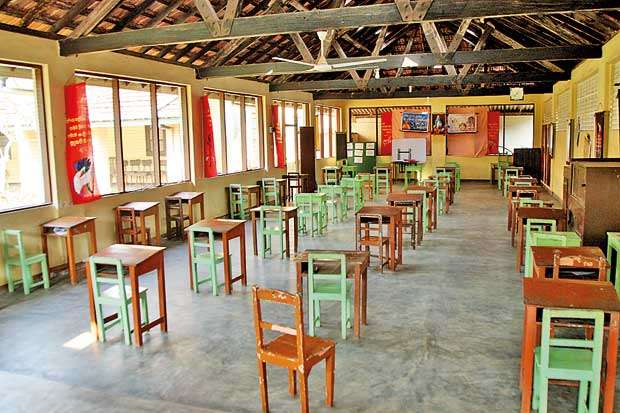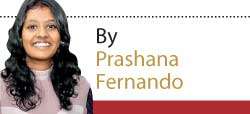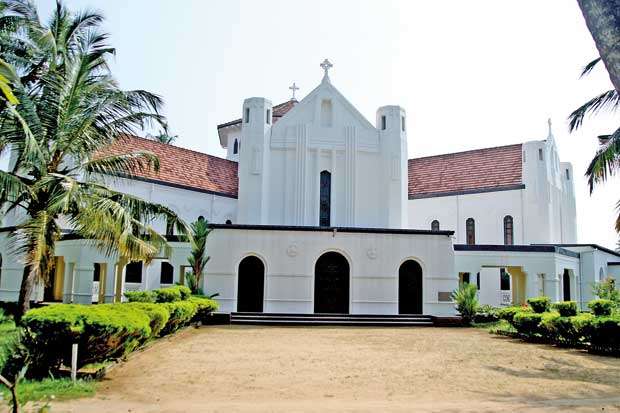06 Dec 2018 - {{hitsCtrl.values.hits}}

 The idyllic Good Shepherd Convent is located in the heart of Wattala, down the busy Hendala Road. As you walk through its large double gates you are instantly made oblivious to the hustle and bustle of the world outside and immersed into the serenity that dominates its premises. Lush greenery, a humble grotto and a chapel will hold your gaze -and at the heart of it all is St. Euphrasia’s Home for women and girls in distress.
The idyllic Good Shepherd Convent is located in the heart of Wattala, down the busy Hendala Road. As you walk through its large double gates you are instantly made oblivious to the hustle and bustle of the world outside and immersed into the serenity that dominates its premises. Lush greenery, a humble grotto and a chapel will hold your gaze -and at the heart of it all is St. Euphrasia’s Home for women and girls in distress.
Taking up the roles of healing and rehabilitation, the sisters of Good Shepherd Convent harbour the victims of rape, abuse, incest, child marriage cases, sexual violence etc. Orphaned, impoverished or victims of legal difficulties, they have all been subjected to vices of society. Regardless of caste or creed, labels and wounds these young girls are able to rediscover self-dignity and aspire to be responsible citizens.
Twenty sixth January 1926 dates Sir Hugh Clifford, the Governor of Ceylon and Rev. Dr. Anthony Coudert OMI, the Archbishop of Colombo declaring open St. Euphrasia’s Home for women and girls in distress. By the end of the first year about 90 admissions were received by the institution. An industrial school was built with Government approval and vocational skills and subjects like embroidery and cooking were taught. The home continued to grow and in 1938 a separate home for unwed mothers and later a crèche and a nursery were erected. As the requirement for a more academic curriculum heightened, in 1922 classes were organized for those whose schooling had stopped midway. Special lessons were conducted for those who needed to sit for the GCE O/L Examinations.
Initially though the majority of the admissions were through private sources, today they are mainly controlled by the Department of Probation and Child Care (DPCC). Many of the girls admitted are subjects of ongoing cases referred to by the courts and thus require secure care. Currently 50 girls reside within these walls under the supervision of several nuns and caretakers.
The girls are immersed in a programme focused on a holistic growth which includes educational, skill development, social, psychological, spiritual and cultural development. A non-formal education is provided and those eligible may sit for the GCE O/L Examination.
While awaiting results, skills training is provided at one of the 2 centres of vocational training run by the GSC nuns. Job placements are found for those suitable for employment and with permission from the DPCC they are returned to their families.
Additionally, programmes like ‘Beads to Business’ introduced by an NGO named ‘Emerge Lanka’ are also conducted. This specific programme was intended to equip teen survivors of abuse with the business and math skills needed to lead healthy, self-sufficient lives.
Orphaned, impoverished or victims of legal difficulties, they have all been subjected to vices of society. Regardless of caste or creed, labels and wounds these young girls are able to rediscover self-dignity and aspire to be responsible citizens
Members of the convent family have familiarised themselves with a strict routine which marks school-time, prayer times, study hours, clean- up days etc. ensuring discipline and productivity. Within the week the girls enjoy zumba lessons, drama, dancing, arts and crafts, sports and outdoor games. Counselling, meditation and prayer are regularly conducted with the aim of healing the wounds of their past. They even celebrate small-scale cultural and religious festivals.
Inside the wooden doors of the home, the girls maintain a self-grown garden where vegetables, fruits and flowers are grown. They each tend to their own plants learning to nurture, parent and reap fruit in life. Two former residents shared how sibling-like friendships are also formed making good-byes hard.
Leaving the Nest Having completed GCE O/L and/or GCE A/L exams they choose their own paths. Some who wish to work are sent to safe places and some who come through courts are sent back to the families by the courts themselves. Others pursue vocational training at ‘Sethsewana’ Bolawalana – another Good Shepherd institution where girls aged 16-25 from child development centres, rehabilitation centres and institutions run by GSC Sisters (and others) are able to develop skills and competencies needed to function in society. Following this course, they will receive job training.
The Daily Mirror had the opportunity to speak with two former residents of S.E’s home who are currently being vocationally trained there in graphic design.

One of them aged 18, described her 9 month stay with the nuns as follows.“They understood us, showed us true love and changed our outlook on life.” She added that “they always pushed us forward and encouraged us to learn and work hard.”
The other aged 19, added to these sentiments. “They helped me fix my life.”Recalling a tender memory; she added, “I fell ill the day before my A/L Exam, and it was sister who nursed me and helped me face the exam.”
Graphic design, tailoring, beauty culture and crafts are a few avenues these girls may choose to follow. By giving the girls such opportunities and supporting them, the convent aspires to prove that an individual’s past and setbacks could be made irrelevant in the process of moving forward, achieving goals and chasing dreams.
“Some girls only have the clothes they are sent here in,” said a sister- in -charge of the safe-home.
The safe-home receives no fixed or consistent funds. Running the household and the in-built school, providing for 50 teen-aged girls and other miscellaneous expenses are covered with only annual flag-day contributions and additional donations. Nevertheless, the girls are kept healthy, happy and safe.
Finding permanent teachers for the school is another challenge. The lack of teachers for certain subjects was an especial blow for the 15 or so girls currently sitting for their GCE O/Ls. Many had disrupted school lives, having been institutionalised since the ages of two or three. Giving priority to such students and to those sitting for national exams, the nuns still persevere and even arrange after-school tuition. Furthermore, printing test papers and study aids are done within the home, which is yet another financial burden to bear.The Nayakakanda community welcomes generosity and all forms of assistance, whether it be clothing, school supplies, dry rations, financial assistance or simply your time and empathy. Nothing goes unappreciated. Philanthropists may contact the home at 0713373881.
It is the cause of unfairly victimised young girls that you consider in aiding this institution, for every contribution goes toward securing their future.
30 Nov 2024 13 minute ago
30 Nov 2024 2 hours ago
30 Nov 2024 5 hours ago
30 Nov 2024 6 hours ago
30 Nov 2024 9 hours ago